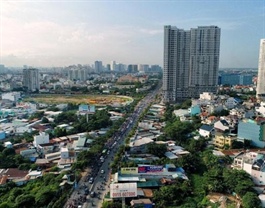Land price framework remains inefficient
Land price framework remains inefficient
Adjusting a land price framework according to the market is necessary, but a number of points could be considered before approval and application, according to experts who contributed to the draft of the adjusted price for the new land law.

Giang Do, advisory director at Savills Ho Chi Minh City, said that for a long time, the city’s land price list has not been maintained and is often significantly lower than the actual market value.
“This prolonged price difference has created a dual price system, leading to many serious consequences,” Giang said.
Foremost, this problem makes state land management difficult and complicated.
“For instance, the discrepancy between the declared price on notarised contracts and the actual transaction price, often aimed at reducing land transfer taxes, has caused inefficiencies. In other cases, annual land lease payments based on outdated and lower-than-market prices have contributed to budgetary losses for the state,” Giang said.
Secondly, the development of real estate projects has been fraught with challenges, particularly in the phases of land acquisition and clearance. Compensation based on undervalued price lists has frequently resulted in delays, dissatisfaction, and financial loss for affected residents, ultimately leading to protracted disputes and land-related litigation.
Given these longstanding issues, adopting a land price list that is aligned with market realities is inevitable, Giang said.
“This progressive shift will address previous shortcomings, ensuring more transparency and fairness in the system. Crucially, a market-driven land price list is expected to facilitate smoother compensation processes, particularly in key infrastructure development projects, by fostering greater public consensus on compensation and support mechanisms,” she added.
However Vo Hong Thang, investment director at DKRA Group, said that the land price framework will likely be adjusted to increase about by as much as 30-fold, and in some cases up to 50-fold in some districts in Ho Chi Minh City.
“Therefore, it will have a profound impact on people and real estate businesses,” Thang said. “For the need to change land use purposes, especially from agricultural land to non-agricultural land, the conversion fee payable will be adjusted to be higher than at present. However, the level of increase is not guidelined by specific circulars or decrees for implementation.”
For households affected by site clearance and compensation, being resettled will have certain advantages in the compensation price as well as in determining the resettlement price, which has been complicated and consumes a lot of time.
The application of land price lists to land tax calculations is also said to have certain impacts that increase non-agricultural land use taxes. However, the application of the new land price list will only be applied after the statute of limitations of the current land price list expires at the end of 2026.
Beneficiaries are those eligible for state compensation and resettlement support are likely to benefit from the updated price list. Households and individuals seeking land-use recognition or changing the purpose of land use, meanwhile, will face the most significant impact.
Under the 2014 Land Law, financial obligations were divided between land within and outside certain thresholds, with different pricing mechanisms applied. However, the 2024 Land Law eliminates this distinction. Now, all land will be calculated based on the updated price list, regardless of thresholds, and adjustments will be made at the onset of the lease period. As a result, while land outside the limit may remain unaffected, land within the limit will see a sharp increase in financial obligations, given the higher proposed prices.
According to Ho Chi Minh City Department of Natural Resources and Environment, the city’s adjusted land price framework will bring specific benefits to both individuals and businesses.
“The adjusted land price framework has been updated in accordance with the actual situation of land prices in the city, which will contribute to making the application convenient, easy, transparent, and at the same time, cutting down on real time and procedures for determining specific land prices are as before,” said a source from the department.
In addition, the land price adjusted list does not affect the specific land valuation to calculate land use fees and land rents of real estate and commercial housing projects due to these projects are calculated using the residual method.
Furthermore, agricultural land prices have been adjusted to suit reality, so investors’ deductions will be more appropriate than before, thereby contributing to improving the business environment while adjusting the selling price of real estate products more appropriately.


























